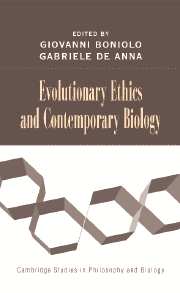Book contents
- Frontmatter
- Contents
- List of Contributors
- Evolutionary Ethics and Contemporary Biology
- Introduction
- PART I THE LIMITS OF EVOLUTIONARY EXPLANATIONS AND JUSTIFICATIONS OF ETHICS
- PART II METHODOLOGICAL ISSUES CONCERNING EVOLUTIONARY ACCOUNTS OF ETHICS
- PART III HOW BIOLOGICAL RESULTS CAN HELP EXPLAIN MORALLY RELEVANT HUMAN CAPACITIES
- PART IV HOW BIOLOGICAL RESULTS CAN HELP EXPLAIN MORAL SYSTEMS
- 8 Biology to Ethics: An Evolutionist's View of Human Nature
- 9 Between Fragile Altruism and Morality: Evolution and the Emergence of Normative Guidance
- 10 Will Genomics Do More for Metaphysics Than Locke?
- Index
- Cambridge Cultural Social Studies
- References
10 - Will Genomics Do More for Metaphysics Than Locke?
Published online by Cambridge University Press: 23 July 2009
- Frontmatter
- Contents
- List of Contributors
- Evolutionary Ethics and Contemporary Biology
- Introduction
- PART I THE LIMITS OF EVOLUTIONARY EXPLANATIONS AND JUSTIFICATIONS OF ETHICS
- PART II METHODOLOGICAL ISSUES CONCERNING EVOLUTIONARY ACCOUNTS OF ETHICS
- PART III HOW BIOLOGICAL RESULTS CAN HELP EXPLAIN MORALLY RELEVANT HUMAN CAPACITIES
- PART IV HOW BIOLOGICAL RESULTS CAN HELP EXPLAIN MORAL SYSTEMS
- 8 Biology to Ethics: An Evolutionist's View of Human Nature
- 9 Between Fragile Altruism and Morality: Evolution and the Emergence of Normative Guidance
- 10 Will Genomics Do More for Metaphysics Than Locke?
- Index
- Cambridge Cultural Social Studies
- References
Summary
Origin of man now solved. He who understands baboon would do more for metaphysics than Locke.
Darwin, NotebooksTHE EVOLUTION OF HUMAN BEHAVIOR AND “JUST-SO STORIES”
Darwin's claim is probably guilty of pardonable exaggeration. After all he did not prove the origin of man, and Locke's greatest contributions were to political philosophy, not metaphysics. But it may turn out that Darwin's twentieth-century grandchild, genomics, vindicates this claim with respect to both metaphysics and political philosophy. Here I focus on the latter claim alone, however.
From the year that William Hamilton first introduced the concept of inclusive fitness and the mechanism of kin selection, biologists, psychologists, game theorists, philosophers, and others have been adding details to answer the question of how altruism is possible as a biological disposition. We now have a fairly well-articulated story of how we could have gotten from there, nature red in tooth and claw, to here, an almost universal commitment to morality. That is, there is now a scenario showing how a lineage of organisms selected for maximizing genetic representation in subsequent generations could come eventually to be composed of cooperating creatures. Establishing this bare possibility was an important turning point for biological anthropology, for human sociobiology, and for evolutionary psychology. Prior to Hamilton's breakthrough it was intellectually permissible to write off Darwinism as irrelevant to distinctively human behavior and human institutions.
- Type
- Chapter
- Information
- Evolutionary Ethics and Contemporary Biology , pp. 178 - 198Publisher: Cambridge University PressPrint publication year: 2006
References
- 4
- Cited by



